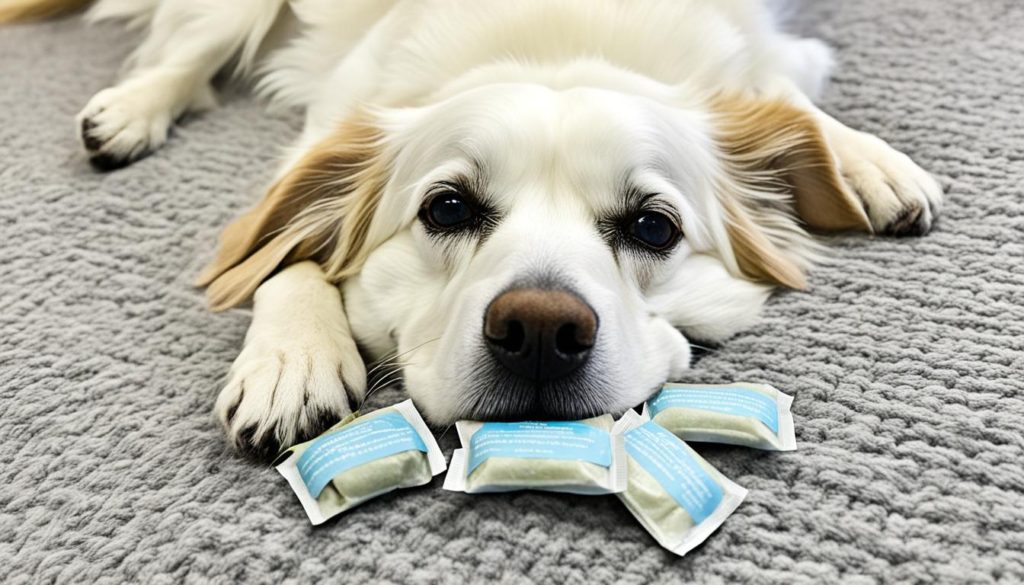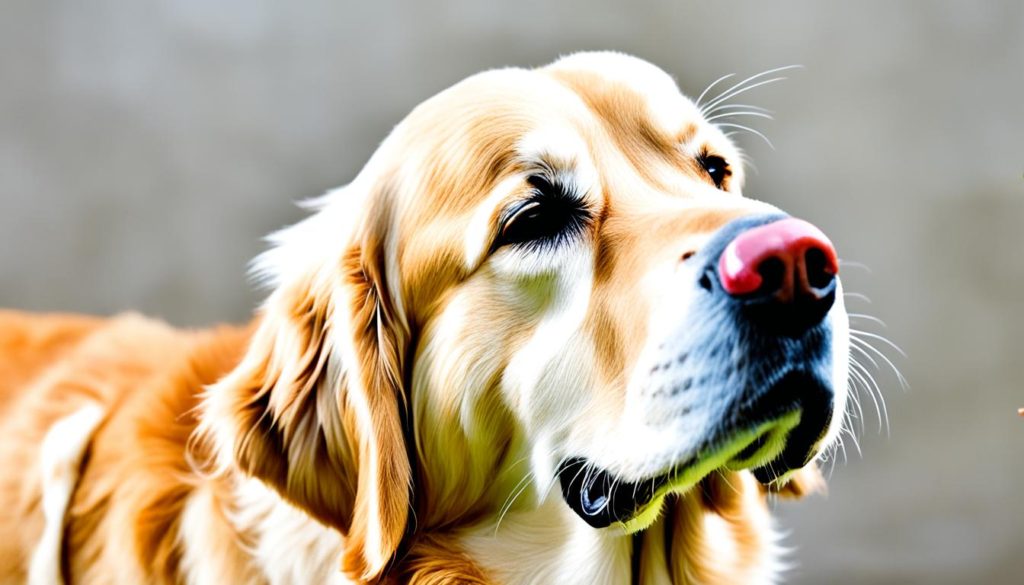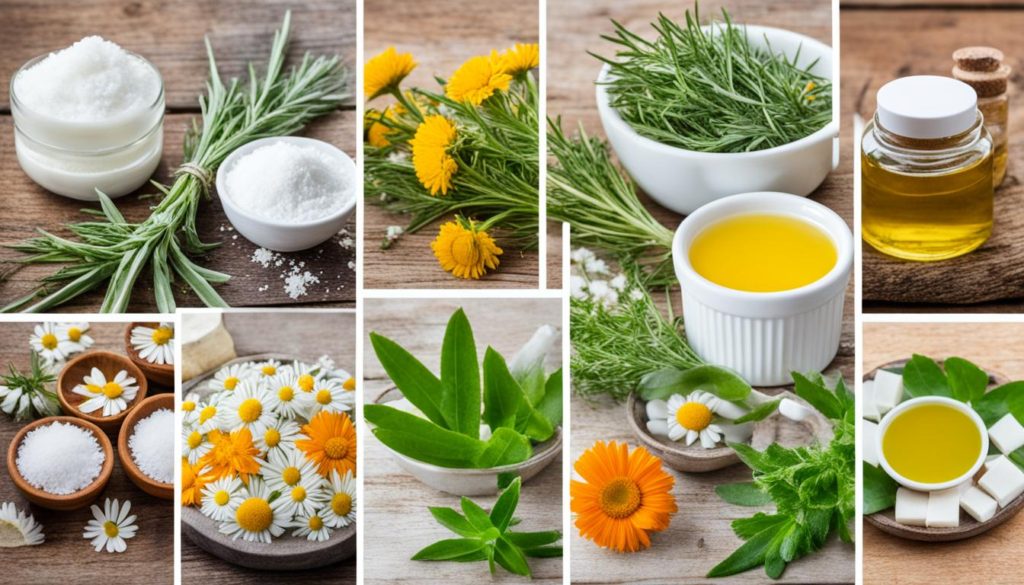If your female dog is experiencing discomfort and inflammation due to vulvar dermatitis, you’ll be relieved to know that there are natural home remedies that can help alleviate her symptoms and promote healing.
By incorporating these remedies into your dog’s routine, you can effectively treat vulvar dermatitis and provide her with much-needed relief.
Home remedies for vulvar dermatitis in dogs focus on reducing itching, inflammation, and other signs of discomfort.
Many of these remedies use natural ingredients that are safe and gentle for your dog’s sensitive skin.
By opting for these holistic remedies, you can avoid harsh chemicals and promote a speedy recovery for your furry friend.
Key Takeaways:
- Dog vulvar dermatitis can cause discomfort and inflammation in female dogs.
- Using natural home remedies can help alleviate symptoms and promote healing.
- Home remedies focus on reducing itching, inflammation, and discomfort.
- These remedies use gentle and natural ingredients for your dog’s sensitive skin.
- By opting for holistic remedies, you can avoid harsh chemicals and promote a speedy recovery.
What is Dog Vulvar Dermatitis?
Dog vulvar dermatitis, also known as dog vaginitis, is an inflammation or infection of the vagina in female dogs. It can be caused by various factors, including bacterial infections, irritation from urine or feces, foreign bodies, trauma, yeast infections, and other underlying health issues.
Understanding the causes of vulvar dermatitis in dogs is essential for effective treatment. By identifying the underlying factors, you can address the root cause and provide appropriate care for your furry friend. Additionally, recognizing the symptoms of dog vulvar dermatitis is crucial in determining the appropriate course of action.
Common symptoms of vulvar dermatitis in dogs include:
- Swelling of the vulva
- Discharge
- Frequent urination
- Discomfort
- Redness
- Licking of the affected area
These symptoms can vary in severity and may cause discomfort or pain to your dog. It is important to observe any changes in your dog’s behavior and physical appearance and consult a veterinarian if you suspect vulvar dermatitis.
Home Remedies for Dog Vulvar Dermatitis
If your female dog is suffering from vulvar dermatitis, there are several effective home remedies you can try to alleviate her discomfort and promote healing. These natural remedies can help reduce inflammation, kill bacteria, and soothe the affected area. Here are some recommended home treatments for vulvar dermatitis in dogs:
Benzoyl Peroxide Bath
To start, give your dog a thorough bath using a mild, medicated shampoo containing benzoyl peroxide. This ingredient has antibacterial properties that can help eliminate harmful bacteria and reduce inflammation. Gently clean the vulvar area and rinse well. Repeat this bath a few times a week or as recommended by your veterinarian.
Apple Cider Vinegar Soak
Another effective remedy is an apple cider vinegar soak. Dilute apple cider vinegar with water at a 1:1 ratio and soak a clean cloth or cotton ball in the solution.
Apply the vinegar-soaked cloth to the affected area for a few minutes, allowing the natural acids in the vinegar to soothe irritation and kill bacteria.
Maintain Clean and Dry Living Area
Keeping your dog’s living area clean and dry is essential for managing vulvar dermatitis. Regularly clean the area where your dog sleeps and remove any wet or soiled bedding. This helps prevent the buildup of bacteria and reduces the risk of further irritation.
Use Unscented Wipes for Cleaning
When cleaning the vulvar area, use unscented and non-alcohol wipes specifically designed for dogs. These wipes can help remove discharge and bacteria, without causing further irritation or discomfort. Be gentle during the cleaning process to avoid any additional trauma to the sensitive area.
Treat with Coconut Oil
Coconut oil has natural anti-inflammatory and antibacterial properties, making it a beneficial remedy for vulvar dermatitis. Apply a small amount of organic, cold-pressed coconut oil to the affected area. It helps soothe irritation, reduce inflammation, and moisturize the skin. Repeat this treatment a few times a day for optimal results.
Add Probiotics to the Diet
Probiotics can support your dog’s immune system and promote a healthy balance of bacteria. Consult with your veterinarian about adding probiotic supplements or incorporating probiotic-rich foods, such as plain yogurt, into your dog’s diet. A healthy gut can contribute to overall skin health and reduce the risk of infections.
Quote:
“Using natural remedies like benzoyl peroxide baths, apple cider vinegar soaks, and coconut oil can effectively soothe vulvar dermatitis in dogs. These home treatments provide relief from inflammation, kill bacteria, and promote healing.” – Dr. Emily Thompson, DVM
Remember, while these home remedies can be effective for mild cases of vulvar dermatitis, it’s important to consult with your veterinarian if the condition persists or worsens. Your vet can provide a proper diagnosis and recommend additional treatments or medication if necessary.
With careful attention and the use of holistic remedies, you can help your canine companion find relief from vulvar dermatitis and restore her comfort and wellbeing.
| Home Remedies | Benefits |
|---|---|
| Benzoyl Peroxide Bath | Eliminates bacteria and reduces inflammation |
| Apple Cider Vinegar Soak | Soothes irritation and kills bacteria |
| Maintain Clean and Dry Living Area | Prevents bacterial buildup and reduces irritation |
| Use Unscented Wipes for Cleaning | Safely removes discharge and bacteria |
| Treat with Coconut Oil | Soothes irritation, reduces inflammation, and moisturizes the skin |
| Add Probiotics to the Diet | Supports immune system and reduces the risk of infections |

CBD Oil for Dog Vulvar Dermatitis
If your dog is suffering from vulvar dermatitis, you may be considering different treatment options to relieve their discomfort. One potential solution that has gained popularity is CBD oil. CBD, or cannabidiol, is a compound derived from the cannabis plant known for its potential therapeutic benefits.

Using CBD oil for dog vulvar dermatitis
CBD oil has shown promising results in relieving inflammation and soothing skin conditions in both humans and animals. When applied topically or administered orally, CBD oil can help alleviate discomfort, reduce redness, and relieve itching associated with vulvar dermatitis in dogs.
It is important to note that every dog is unique, and their response to CBD oil may vary. It is recommended to consult with a veterinarian before incorporating CBD oil into your dog’s treatment plan. They can provide guidance on proper dosage and monitor your dog’s progress.
Benefits of CBD oil for dog vulvar dermatitis
One of the significant benefits of using CBD oil for dog vulvar dermatitis is its potential anti-inflammatory properties. CBD interacts with the endocannabinoid system in the body, which plays a role in regulating inflammation. By reducing inflammation, CBD oil can help alleviate the discomfort and itching associated with vulvar dermatitis.
In addition to its anti-inflammatory properties, CBD oil may also have soothing effects on the skin. It can help promote healing and moisturize the affected area, providing relief for your dog.
Note: While CBD oil shows promise in managing vulvar dermatitis symptoms in dogs, it is essential to consult with a veterinarian before starting any new treatment. They can provide personalized advice based on your dog’s specific needs and overall health.
Other Treatments for Dog Vulvar Dermatitis
In some cases, home remedies may not be enough to treat dog vulvar dermatitis, especially if the condition is severe or persists. In such cases, other treatments may be necessary.
- Topical Medication: Topical medications can be used to relieve pain and inflammation associated with dog vulvar dermatitis. These medications are applied directly to the affected area and can help reduce itching and discomfort.
- Antibiotics: If the vulvar dermatitis is caused by a bacterial infection, your veterinarian may prescribe antibiotics to treat the infection. Antibiotics can help eliminate the bacteria and reduce inflammation.
- Spaying: In some cases, hormonal imbalances can contribute to the development of vulvar dermatitis. Spaying your dog can help prevent these imbalances and reduce the risk of recurrence.
- Surgery: If anatomical abnormalities or foreign bodies are present, surgery may be necessary to address the underlying cause of vulvar dermatitis. Surgery can remove any obstructions or correct abnormalities that may be contributing to the condition.
The choice of treatment will depend on the underlying cause and severity of the condition. Consulting with a veterinarian will help determine the most appropriate treatment plan for your dog’s vulvar dermatitis.
| Treatment | Description |
|---|---|
| Topical Medication | Relieves pain and inflammation |
| Antibiotics | Treats bacterial infections |
| Spaying | Prevents hormonal imbalances |
| Surgery | Removes anatomical abnormalities or foreign bodies |
Prevention Tips for Vaginitis in Dogs
Preventing vaginitis in dogs is crucial for maintaining their overall health and well-being. By following these prevention tips, you can minimize the risk of your dog developing vulvar dermatitis.
Balanced Hygiene
Proper hygiene plays a vital role in preventing vaginitis in dogs. Regularly clean your dog’s vulvar area with a gentle cleanser to remove any dirt or bacteria buildup. Avoid using harsh soaps or chemicals that may irritate the sensitive skin. Keeping the area clean promotes a healthy environment and prevents potential infection.
Frequent Urination Opportunities
Ensure that your dog has ample opportunities to urinate throughout the day. Encourage frequent potty breaks to prevent the accumulation of urine or feces around the vulva, which can lead to irritation and inflammation. Taking your dog for regular walks and providing a consistent routine will help prevent stagnation of urine and potential infection.
Regular Veterinary Check-ups
Regular veterinary check-ups are essential for monitoring your dog’s overall health and well-being. During these visits, your veterinarian can examine your dog’s vulva to identify any early signs of vulvar dermatitis or underlying health issues. This proactive approach allows for timely intervention and treatment, ensuring your dog’s optimal health.
Healthy Diet
A balanced and nutritious diet plays a fundamental role in supporting your dog’s immune system and overall well-being. Provide your dog with high-quality, age-appropriate food that is rich in essential nutrients and vitamins. A healthy diet helps maintain a robust immune response, reducing the risk of developing vulvar dermatitis.
Proper Hydration
Ensure that your dog has access to clean, fresh water at all times. Proper hydration promotes healthy bodily functions and helps maintain optimal vaginal health. Adequate hydration aids in flushing out toxins and bacteria that may contribute to vulvar dermatitis. Monitor your dog’s water intake and refill the water bowl regularly to encourage proper hydration.
| Prevention Tips for Vaginitis in Dogs |
|---|
| Maintain proper hygiene by regularly cleaning your dog’s vulvar area. |
| Ensure your dog has ample opportunities to urinate, preventing the accumulation of urine or feces around the vulva. |
| Schedule regular veterinary check-ups to monitor your dog’s overall health and identify any early signs of vulvar dermatitis. |
| Provide a balanced and nutritious diet to support your dog’s immune system and well-being. |
| Ensure your dog has access to clean water for proper hydration. |
When to Seek Veterinary Care for Vaginitis in Dogs
While home remedies can often alleviate vaginitis in dogs, there are instances when it is important to seek veterinary care.
Recognizing the signs and knowing when to consult a veterinarian can help ensure proper diagnosis and treatment for your dog’s vulvar dermatitis.
Signs to Seek Veterinary Care for Vaginitis in Dogs
If your dog exhibits any of the following signs, it is advisable to schedule an appointment with a veterinarian:
- Persistent or worsening symptoms: If your dog’s vulvar dermatitis persists or worsens despite trying home remedies, it could indicate the need for professional intervention.
- Severe discomfort or pain: Dogs experiencing severe discomfort or pain, such as excessive licking, whimpering, or reluctance to move, should be seen by a veterinarian to alleviate their discomfort.
- Other underlying health issues: If your dog has other underlying health issues, such as a weakened immune system or hormonal imbalances, that may be contributing to vulvar dermatitis, it is important to address these issues alongside the dermatitis itself.
By promptly seeking veterinary care, you can ensure that your dog receives the necessary treatment and support for their vulvar dermatitis, leading to faster healing and relief from discomfort.
| When to Seek Veterinary Care for Vaginitis in Dogs | Signs to Look Out For |
|---|---|
| Vulvar dermatitis persists or worsens despite home treatments | Excessive licking, redness, swelling, discharge, or discomfort |
| Dog shows signs of severe discomfort or pain | Excessive vocalization, reluctance to move, whimpering, or whimpering while urinating |
| Other underlying health issues | Weak immune system, hormonal imbalances, or recurring infections |
Next Steps at the Veterinary Clinic
During your visit to the veterinarian, they will perform a thorough examination of your dog’s vulvar area to assess the severity of the dermatitis. They may take samples for diagnostic tests or perform additional procedures to identify any underlying causes contributing to the condition.
Seeking veterinary care ensures that your dog’s vulvar dermatitis receives proper medical attention, addressing any potential complications or underlying health issues.
Based on the specific needs of your dog, the veterinarian will provide a tailored treatment plan which may include medicated creams, antibiotics, anti-inflammatories, or other prescribed medications. They will also provide guidance on further home care and preventive measures to promote a swift recovery and reduce the risk of future episodes of vulvar dermatitis.
Conclusion
In conclusion, when it comes to dog vulvar dermatitis, there are effective home remedies that can provide relief and promote healing. By utilizing natural remedies such as bathing, apple cider vinegar, coconut oil, and probiotics, you can alleviate the symptoms of vulvar dermatitis in dogs and reduce inflammation.
However, it’s important to remember that home remedies may not always be sufficient, especially in severe cases. If your dog’s condition persists, worsens, or if they are experiencing severe discomfort or pain, it’s crucial to seek veterinary care.
A veterinarian can provide a proper diagnosis, recommend appropriate treatment options, and address any underlying health issues that may be contributing to the vulvar dermatitis. By consulting with a professional and prioritizing your dog’s health and well-being, you can effectively manage and prevent vaginitis in dogs.
FAQ
What is dog vulvar dermatitis?
Dog vulvar dermatitis, also known as dog vaginitis, is an inflammation or infection of the vagina in female dogs.
What are the causes and symptoms of vulvar dermatitis in dogs?
Vulvar dermatitis in dogs can be caused by bacterial infections, irritation from urine or feces, foreign bodies, trauma, yeast infections, and underlying health issues. Symptoms may include swelling of the vulva, discharge, frequent urination, discomfort, redness, and the dog licking the affected area.
What are some home remedies for dog vulvar dermatitis?
Some effective home remedies for dog vulvar dermatitis include giving your dog a thorough bath using benzoyl peroxide, applying apple cider vinegar to the affected areas, keeping the living area clean and dry, using unscented wipes for cleaning, treating the affected areas with coconut oil, and adding probiotics to your dog’s diet.
Can CBD oil help with dog vulvar dermatitis?
CBD oil has potential anti-inflammatory and soothing properties that can provide relief for dogs with vulvar dermatitis. It can help alleviate discomfort, reduce redness, and relieve itching associated with this condition. However, it is important to consult with a veterinarian before using any new treatment for your dog’s health issues, including CBD oil.
What are the other treatments for dog vulvar dermatitis?
Other treatments for dog vulvar dermatitis can include topical medications to relieve pain and inflammation, antibiotics to treat bacterial infections, spaying to prevent hormonal imbalances, and surgery to remove anatomical abnormalities or foreign bodies. The choice of treatment will depend on the underlying cause and severity of the condition.
How can I prevent vaginitis in dogs?
To prevent vaginitis in dogs, you can maintain proper hygiene by regularly cleaning your dog’s vulvar area, ensure they have adequate opportunities to urinate, schedule regular veterinary check-ups, provide a balanced and nutritious diet, and ensure your dog has access to clean water for proper hydration.
When should I seek veterinary care for vaginitis in dogs?
It is important to seek veterinary care when the condition persists or worsens despite home treatments, when the dog shows signs of severe discomfort or pain, or when there are other underlying health issues that need to be addressed. A veterinarian will be able to provide a proper diagnosis and recommend appropriate treatment options based on the specific needs of your dog.

